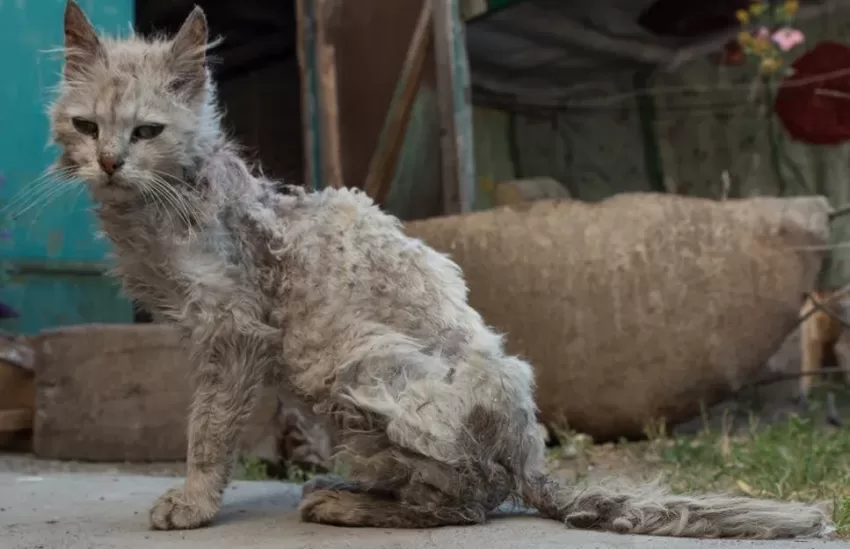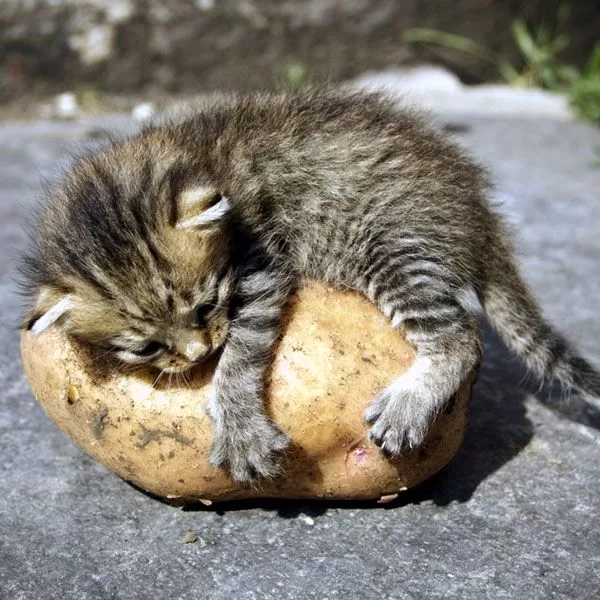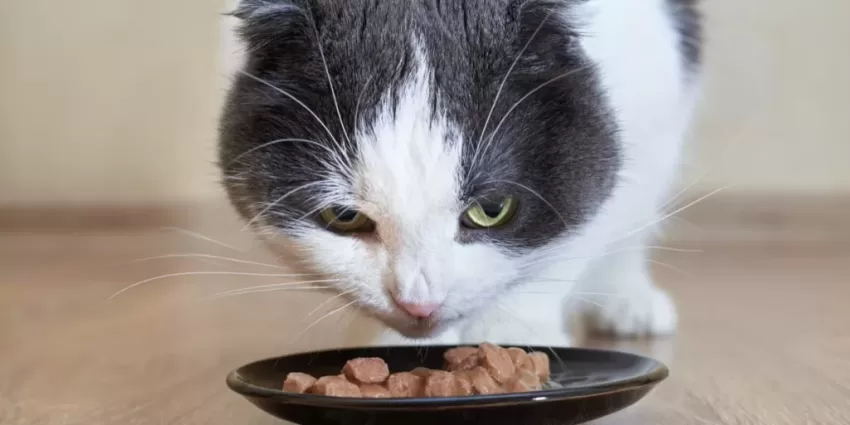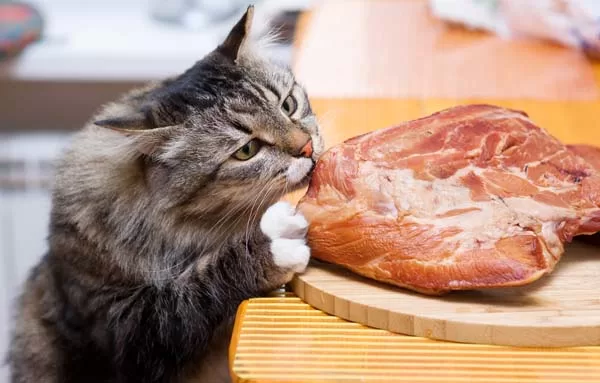Introduction: Vegan or Vegetarian Cats?
Ever wondered if cats can be vegan or vegetarian? After all, we adults have the freedom to choose our diet. But what about pets? At the heart of this question is an intriguing concept – vegan and vegetarian diets for cats.
Cat food is a topic full of controversy. For example, some claim that a plant-based diet can be beneficial for them. However, others argue that cats are carnivores by nature and need meat to survive. That is, it is not an easy decision to make because it involves the well-being of our pet. So let’s explore this topic together and see what we discover!
Risks of Vegan Food for Cats
Lack of Essential Nutrients
Cats are carnivores by nature. A vegan diet, which excludes all animal products, can leave these cats without vital nutrients needed for their health and well-being. Cats need specific amino acids, such as taurine and arginine, which are mainly found in meat.
- Taurine: Deficiency of this substance can lead to serious heart problems and blindness in cats.
- Arginine: It is vital for the removal of ammonia from the body of cats. Without it, cats can suffer from ammonia toxicity.

Health Problems Due to the Vegan Diet
A strictly vegan diet can cause a number of health problems in cats:
- Urinary issues: Vegan cats are at increased risk of developing crystals in their urine and urinary tract infections.
- Weight Loss: A vegan diet does not provide enough calories a cat needs to maintain a healthy weight.
- Anemia: A lack of vitamin B12, found only in animal-derived foods, can lead to anemia.
Risks Associated with Nutritional Deficiency
Nutritional deficiency in vegan cats is a serious problem. Not only can it lead to immediate problems like weight loss and lethargy, it also has the potential to cause long-term damage to feline health:
- Dental issues: Dry food helps keep cats’ teeth clean. A plant-based diet can lead to tartar buildup.
- Inadequate growth: Kittens fed a vegan diet may not grow properly.
- Digestive issues: Cats have a digestive system designed to process meat. An abrupt switch to a vegan diet can lead to digestive issues.
As tempting as it may be to apply our own food choices to our pets, we must remember that they have very different nutritional requirements than ours. Before deciding to change your pet’s diet, always consult a veterinarian or animal nutrition specialist.
So answering the initial question “can cats be vegan or vegetarian?” – technically they can be fed a plant-based diet, but that would put their health at serious and potentially fatal risk. Therefore, it is neither recommended nor ethical to force them to follow such a diet.

Benefits of a Vegetarian Diet in Felines
Can cats be vegan or vegetarian? This issue has been the subject of much debate. However, there are some potential benefits that a vegetarian diet can bring to cats.
Longevity and Well-being
First, let’s talk about longevity and well-being. Many pet owners believe that a vegetarian diet can contribute to their cat’s longevity. This is because plant-based diets tend to be lower in saturated fat and cholesterol, which can reduce the risk of obesity and heart disease.
In addition, vegetarian diets are high in fiber, which is beneficial for cats’ digestion. Additionally, some research suggests that a plant-based diet may help prevent certain cancers in cats.
However, it’s important to remember that every cat is unique and has its own nutritional needs. Therefore, before changing your cat’s diet to vegetarian or vegan, it is essential to consult a veterinarian.
Scientific Evidence
Now let’s look at the scientific evidence behind the benefits of vegetarian food in cats. Currently, there are few studies on this specific topic. However, some studies have shown promising results.
For example:
- A study published in the Journal of the American Veterinary Medical Association found that dogs fed plant-based diets had lower levels of several inflammatory markers.
- Another study published in the journal PLoS One found that dogs fed a plant-based diet had a more diverse gut microbiome than those fed a meat-based diet.
Although these studies were conducted in dogs and not cats, they still provide some indication of the possible benefits of plant-based diets for domestic animals.
In short, while there is some debate over whether cats can be vegan or vegetarian, there is growing evidence of the potential benefits of plant-based diets for felines. However, always consult a veterinarian before making any significant changes to your pet’s diet.

Veterinary Opinion on Vegan Cats
Professional veterinarians have different opinions about vegan and vegetarian diets for cats. According to some, cats can have a plant-based diet as long as they are supplemented correctly. However, others claim that felines are obligate carnivores and need nutrients found only in meat.
Proper feline nutrition is a complex topic. Cats have specific nutritional needs that are not easily met by a vegan or vegetarian diet. For example:
- Taurine: An essential amino acid found only in animal foods.
- Vitamin A: Unlike humans and dogs, cats cannot convert beta-carotene (found in plants) into vitamin A.
- Omega-3 fatty acids: Found primarily in fish oil, they are important for brain and heart health.
Veterinarians also express concerns about alternative diets in felines. An inadequate diet can lead to serious health problems in pets, such as heart disease and inflammatory problems.
Veterinary Recommendations
Veterinary recommendations for feeding cats often include:
- Commercially Balanced Foods: These products have been formulated to meet the nutritional needs of cats.
- Supplements: If the owner opts for a homemade diet, whether meat or vegetable based, consideration should be given to using supplements to ensure that all nutritional needs are met.
- Regular monitoring: Regardless of the diet choice, it is important to regularly monitor the pet’s health with veterinary checkups.
Ultimately, every cat is unique and has its own nutritional needs. The most important thing is to make sure your pet is getting all the nutrients it needs to live a healthy and happy life.
“Would it be possible for a cat to be vegan? Maybe yes, but would it be easy? Probably not.” – Dr. Vet XYZ
Always remember to consult a professional before making any significant changes to your pet’s diet!
Composition of Vegetarian Feeds
When discussing the question: can cats be vegan or vegetarian? It is essential to evaluate the composition of vegetarian feeds. These are foods that, instead of animal protein, contain a variety of plant ingredients.
Typical Ingredients
- Soy
- Rice
- Quinoa
- spirulina
Soy and rice are among the main components of these feeds, serving as a primary source of protein. Additionally, some manufacturers include quinoa and spirulina to increase the nutritional content.
Grains are a substantial part of the composition of these feeds. However, it’s important to remember that felines did not evolve to digest grain efficiently like humans do.
Critical Analysis of the Nutritional Composition
Compared to conventional rations with meat, vegetarian rations have some significant differences:
Vegetarian Ration | Conventional Ration | |
|---|---|---|
Proteins | In less quantity | Adequate amount |
carbohydrates | In bigger quantity | moderate amount |
Vegetarian rations usually have a lower amount of protein and a higher amount of carbohydrates than conventional ones. This can lead to nutritional deficiencies in cats if not supplemented with proper supplementation.
Supplementation: A Necessity?
Due to the lack of animal protein in cats’ vegetarian diets, it is vital to provide supplementation to ensure all nutritional needs are met. Taurine, for example, an essential amino acid found only in animal meat, should be added to your cat’s vegetarian food to avoid serious deficiencies.
However, even with careful supplementation and constant monitoring of your cat’s health by a veterinarian experienced in alternative pet diets, there are still risks associated with exclusively plant-based feeding of cats.
In summary, while it is possible to formulate a vegetarian diet that meets the nutritional needs of felines in theory, in practice it can be difficult to ensure that all the specific requirements of the body of this obligate carnivore are met without the inclusion of any type of meat.
Homemade Diet vs Vegan Diet in Cats

Diet Comparison
Feline diet is a subject that generates a lot of discussion. Some support the idea that cats can be vegan or vegetarian, while others argue that a homemade diet is better suited to the specific nutritional needs of these animals.
- Homemade diet: One of the advantages of the homemade diet is the possibility of controlling all the ingredients used in the cat’s food. However, this option requires time, effort and knowledge about the necessary nutritional balance for felines.
- Vegan/vegetarian diet: The main advantage of a vegan or vegetarian diet for cats is to avoid animal exploitation. However, there is a significant risk of nutritional deficiencies if this diet is not well planned and monitored.
Nutritional Balance
When preparing homemade feline meals, ensuring the proper nutritional balance is crucial. Cats are obligate carnivores and need certain nutrients found only in meat, such as taurine, vitamin A and arachidonic acid. Therefore, an exclusively vegetable diet can lead to serious health problems.
- Taurine: Essential for heart health and vision in cats.
- Vitamin A: Needed for healthy skin, night vision and growth.
- Arachidonic Acid: Key to the immune system and inflammation.
Preparation of Homemade Meals
Preparing homemade meals suited to the specific nutritional requirements of cats takes considerable time and effort. It is necessary to have an in-depth knowledge of the dietary needs of cats and to be skilled in the kitchen to prepare balanced dishes.
For example:
- Raw meats must be frozen for at least 72 hours before use to kill parasites.
- Cooked bones can splinter and cause blockages or perforations in the animal’s digestive system.
- Vegetables should be cooked until soft to facilitate digestion.
In summary, both a homemade and a vegan/vegetarian diet have their advantages and disadvantages when it comes to feline nutrition. The most important thing is to remember that each animal has individual needs that must be taken into account when choosing its food.
Essential Nutrition for Cats: A Practical Guide
Essential nutrients for cats
The essential nutrients that should be present in your pet’s daily diet are:
- Proteins: Proteins are important for the growth and repair of tissues in the body. They need a significant amount in their diet.
- Fats: Fats provide most of the energy needed by cats. In addition, some vitamins can only be absorbed with the help of fats.
- Vitamins and Minerals: Each complete vitamin and mineral plays a specific role in the animal’s body. For example, calcium is important for the formation and maintenance of bones.
- Water: Water is vital for all biological processes in the cat’s body.
How to ensure proper nutrition?
Now that you know the essential nutrients, how do you make sure your pet is getting all of them through their food? Here are some practical tips:
- Choose whole foods : Choose foods that contain all the necessary nutrients in adequate amounts.
- Avoid Overeating : While it’s important to meet your cat’s nutritional needs, overeating can also be harmful.
- Consult a veterinarian : Your veterinarian can give you detailed advice on the ideal diet for your cat, taking into account factors such as age, breed and health status.
Home Recipe
If you choose to prepare your cat’s food at home, remember that it needs to be balanced and complete. A good recipe should include a protein source (such as meat or fish), a carbohydrate source (such as rice or potatoes), and assorted vegetables.
Always remember that each cat is unique and their nutritional needs may vary depending on age, breed, level of physical activity and other factors. Therefore, it is always recommended to consult a veterinarian before making any significant changes to your pet’s diet.
Conclusion: Feasibility of the Vegan Diet in Cats
Despite potential benefits to human health and the environment, a vegetarian or vegan diet may not be suitable for cats. Cats are obligate carnivores and need certain nutrients that can only be obtained through animal foods.
The risks associated with vegan cat food are significant. A lack of taurine, an essential amino acid found only in meat, can lead to serious heart problems. Furthermore, vegan diets can cause nutritional deficiencies that result in diseases and adverse conditions.
Veterinary opinion is clear: cats should not be on a vegan diet without medical supervision. If you are considering this option, it is important to consult a qualified professional.
The vegetarian feed available on the market may not meet the specific nutritional needs of cats. It is crucial to remember that every cat is unique and has individual dietary requirements.
Comparatively, a balanced homemade diet may offer more benefits than a vegan diet in terms of your cat’s overall health.
In summary, while it is possible to provide a vegetarian or vegan diet for cats with careful veterinary guidance and adequate supplementation, this requires constant commitment and vigilance on the part of the pet owner. Therefore, before making any decision about your pet’s diet, always consult an expert!
FAQ
Can cats be vegan or vegetarian?
Cats are strict carnivores by nature. They have specific nutritional requirements that can only be met through eating meat.
What happens if a cat eats only plant foods?
An exclusively vegetable diet can lead to the deficiency of important nutrients such as taurine and arginine, vitamin B12, vitamin D3 and other essential elements found in meat.
Would a commercial vegetarian food be enough for my cat?
Even commercial pet foods labeled “vegan” or “vegetarian” may not provide all the nutrients needed to keep your cat healthy.
Is it safe to make homemade food for my cat?
Homemade food can be beneficial if prepared correctly under veterinary guidance. However, it is essential to ensure that all of your pet’s nutritional needs are met.
Is there any safe way to make my cat vegan?
While technically possible with strict supplementation and constant monitoring by a qualified veterinarian, there are still risks involved.
External Links:
http://www.iams.com/pet-health/dog-life-stages/understanding-animal-based-proteins-in-dog-foods
